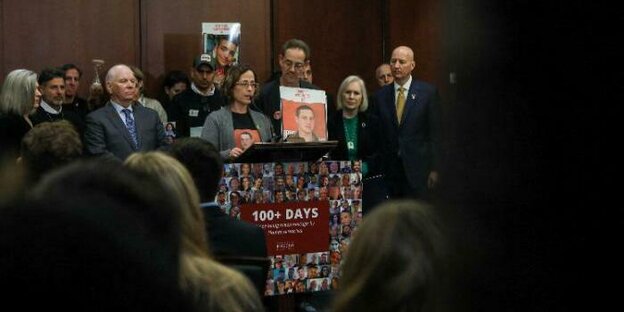Negotiators in Paris are discussing a comprehensive deal between Israel and Hamas. According to Israeli media, differences still exist.

Relatives ask for US support to free the hostages at a news conference in Washington on January 17. Photo: Anna Rose Layden/rtr
SEDAN taz | The who's who of hostage diplomacy was expected to be in Paris on Sunday to free the Israelis who were kidnapped more than 100 days ago in the Gaza Strip and put an end for now to widespread Israeli bombing. According to media reports, the Paris talks revolve around an agreement that stipulates that fighting should cease in an initial 30-day phase. In exchange, the terrorist organization Hamas releases all the women, elderly and wounded hostages. It was unclear how many Palestinian prisoners would be released from Israeli jails.
During this period, Israel and Hamas are expected to work out the details of a new month-long phase in which Israeli soldiers and kidnapped male civilians will also be released. Israel should also allow more humanitarian aid into the Gaza Strip. Aid deliveries to the area are proceeding extremely slowly, even though the UN says 85 percent of the population inside Gaza has been displaced and international aid organizations warn of famine.
The possible agreement includes the release of all hostages. What it does not contain is an agreement to end the war. Israel could resume large-scale attacks after two months to achieve its stated goal of completely destroying Hamas.
The talks in Paris were expected to be attended by the head of the US foreign secret service, the CIA, William Burns, his Israeli counterpart, David Barnea, of the Mossad, the Qatari prime minister, Mohammed bin Abdulrahman Al Thani, and the head of intelligence Egyptian, Abbas Kamel. He New York Times had reported on the emerging deal on Saturday.
If it really comes to fruition, it would be the second global agreement between the parties in conflict. In November, more than 100 Israeli hostages were freed during a seven-day ceasefire. According to Israeli information, Hamas is still holding 104 hostages, including some German citizens. Another 28 people are said to be dead.
Pressure on Netanyahu is increasing
In Israel, pressure has recently increased on Prime Minister Benjamin Netanyahu to prioritize the release of the hostages rather than continuing the war in all its severity. On Saturday night, thousands of people protested again in Tel Aviv and demanded Netanyahu's resignation. “The failed government continues as if nothing had happened,” one of the speakers at the demonstration reportedly said.
However, Israeli media on Sunday dampened hopes that the Paris meeting would lead to an agreement between Israel and Hamas. Consequently, Hamas demands that Israel end the war completely and remain in power. For the Netanyahu government to officially declare this would be tantamount to admitting defeat.
“A ruthless military campaign to decimate the population”
According to Palestinian figures, more than 26,000 people have been killed in the ongoing fighting in Gaza. According to Israeli information, around a third of them are Hamas fighters. Neither figure has been independently verified.
The International Court of Justice (ICJ) in The Hague on Friday called for more aid for the people of the Gaza Strip. Israel must also do everything possible to ensure that “genocide” does not occur. The court did not demand an end to the war. Netanyahu expressed “Israel's respect for international law” but called the genocide accusations “outrageous.”
South Africa, which brought the suit, called the decision “a decisive victory for the international rule of law.” Amnesty International's Agnès Callamard said the preliminary decision shows that the world will not remain silent as Israel carries out a ruthless military campaign to decimate Gaza's population.